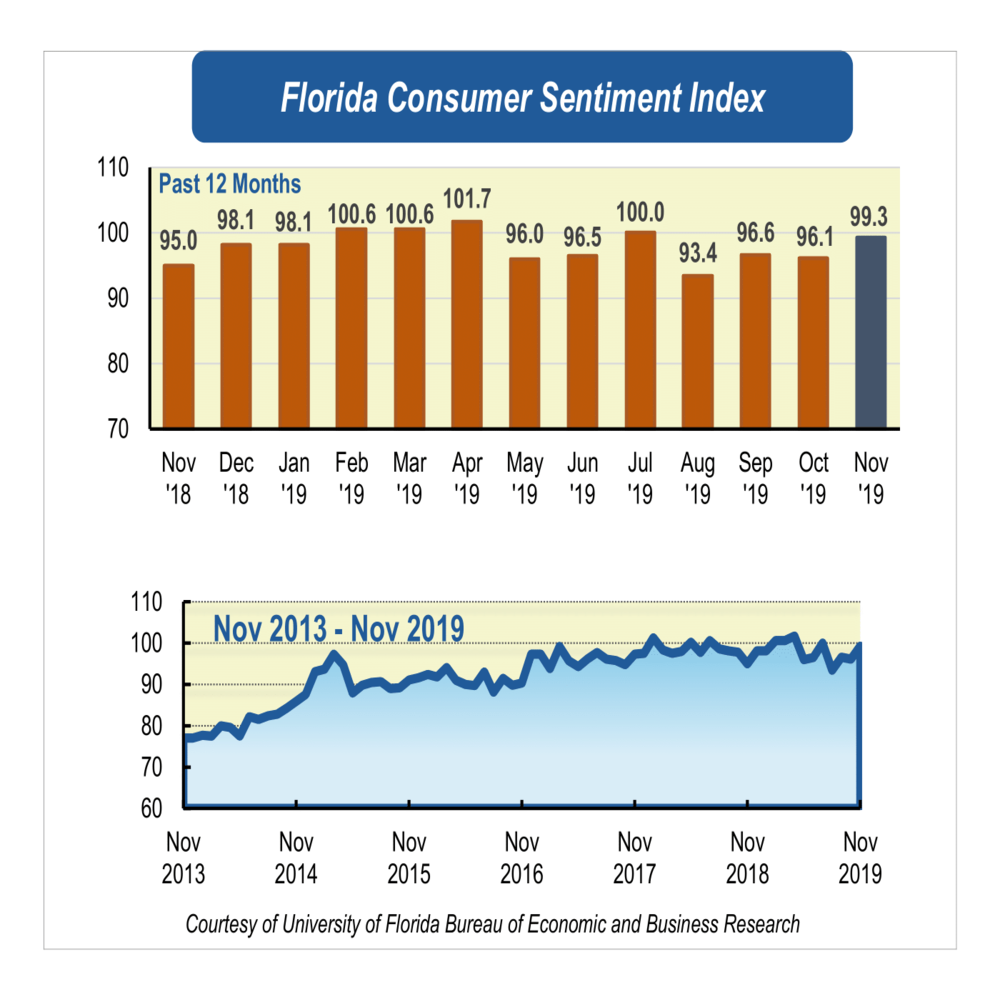
Consumer sentiment rises in November heading into the holiday season
Consumer sentiment among Floridians increased in November 3.2 points to 99.3 from October’s revised figure of 96.1. Similarly, the University of Michigan’s nationwide index of consumer sentiment increased in November.
All five components that make up the index increased.
Floridians’ opinions of their personal financial situation now compared with a year ago increased 1.8 points from 92.7 to 94.5. However, these views are divided by gender and age. While men and those age 60 and older expressed favorable views, women and those younger than age 60 expressed less positive opinions. Likewise, opinions as to whether now is a good time to buy a major household item like an appliance increase one point from 102.3 to 103.3, with only women reporting less favorable views.
“Overall, these two components showed that perceptions regarding current economic conditions improved among Floridians in November, This increase is largely driven by the perception of men,” said Hector H. Sandoval, director of the Economic Analysis Program at UF’s Bureau of Economic and Business Research.
Similarly, the three components corresponding to Floridians’ expectations about future economic conditions also improved.
Outlooks of personal financial situations a year from now increased 3.7 points from 104.2 to 107.9. Expectations of U.S. economic conditions over the next year showed the greatest increase in this month’s reading, rising 7.1 points from 90.4 to 97.5. Finally, expectations of U.S. economic conditions over the next five years increased 2.2 points from 91 to 93.2. These opinions are shared by almost all Floridians; however, those younger than age 60 reported less favorable expectations about their future financial situation and those age 60 and older reported less favorable views regarding their expectations of U.S. economic conditions in the long-run.
“Despite the divided views among younger and older Floridians, they’re overall more optimistic in November. The gain in November’s sentiment came from consumers’ future expectations about the national economy in the short-run. Remarkably, responses to this component are shared by all Floridians though men and Floridians whose income is above $50,000 reported stronger, more positive views,” Sandoval said.
Economic activity in Florida continues to be positive, with the economy adding more jobs statewide in October. Over the last year, 228,600 more jobs were added, an increase of 2.6% compared with October 2018. Among all industries, education and health services gained the most jobs, followed by professional and business services, leisure and hospitality, and construction. The only industry that lost jobs was the information industry. The Florida unemployment rate remained unchanged from a month ago at 3.2% in October. Furthermore, according to the Bureau of Economic Analysis, real gross domestic product in Florida increased 2% in the second quarter of 2019. The real estate and rental and leasing industry and the professional, scientific, and technical services industry contributed the most to the increase.
“Consumer sentiment in Florida remains high, and November’s reading is higher than the average of the last 12 months. Looking ahead to the coming months, in view of the realized economic outlook in Florida, we anticipate consumer sentiment to remain high,” Sandoval said.
Conducted November 1-24, the UF study reflects the responses of 504 individuals who were reached on cellphones, representing a demographic cross section of Florida. The index used by UF researchers is benchmarked to 1966, which means a value of 100 represents the same level of confidence for that year. The lowest index possible is a 2, the highest is 150.
Details of this month’s survey can be found at https://www.bebr.ufl.edu/florida-consumer-sentiment/